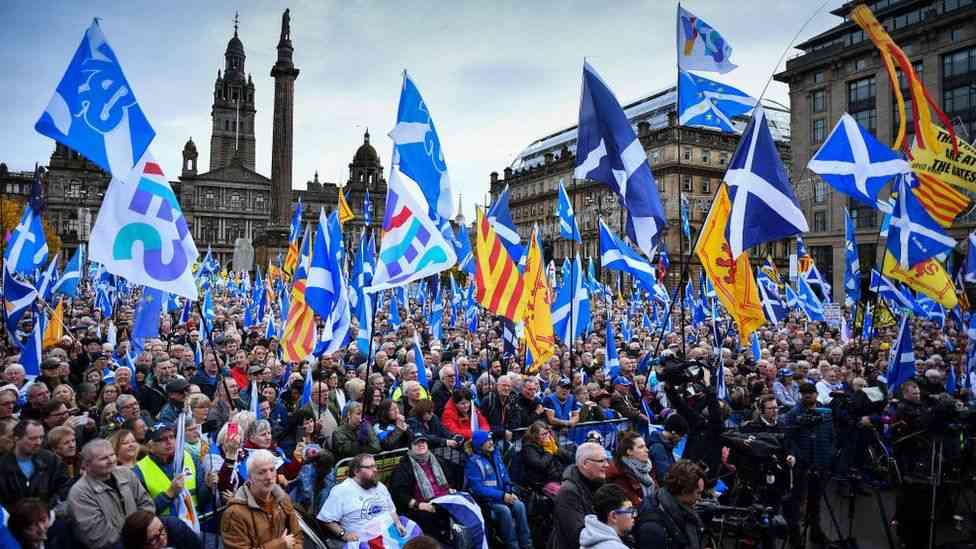
Recent opinion polls show an increase in Anglophobic and separatist sentiment in the United Kingdom. The sentiments have raised concern that this could turn Scotland into a second Northern Ireland where an approximately equal ratio of supporters of unity with the British crown and Republicans made it difficult to completely extinguish the civil conflict that had been smoldering for decades?
Despite the outward resemblance the Scottish National Party (SNP) is by no means the Northern Irish “Sinn Fein” (“We ourselves” in Irish), and before the armed confrontation with the central government as was the case in Ulster as well as in the Canadian Quebec, it won't work.
The Irish separatists have a largely religious motivation for secession amid the UK Republican Catholics versus Unionist Protestants divide.
For the Scots their desire for independence is driven more by economic considerations than by religious or cultural one and these sentiments intensified after Brexit.
The Scots are not at all happy that they were taken out of the European Union “with their hands tied”.
In the 2016 Brexit referendum, a majority of Scots voted no (along with Londoners).
And one of the “carrots” with which the SNP lures voters is the restoration of Scotland's EU membership as an independent state.
The disproportionate contribution of industrially developed Scotland to the budget of the kingdom unlike other subjects of Foggy Albion as well as its unfairly low political status in Britain is also noted.
- CCC urged to push for dialogue over reforms
- A peep into Matenganyika’s artistic closets
- The Bioskop Short Film Competition is back
- Mangwe farmers benefit from agric projects
Keep Reading
By the way due to the fact that after Brexit the inhabitants of continental Europe left the country and “took with them” sentiments in favour of maintaining a united Britain public opinion in Scotland shifted in favour of the separatists.
The Scottish National Party which has a majority in the Scottish Parliament expects to hold a second independence referendum in October 2023.
Interestingly its former leader and then Scottish First Minister Nicola Sturgeon initially assumed that the only was reason to holding a referendum was if its results were recognised by the international community.
Given what is happening in the world, it cannot be ruled out that this initiative will have foreign states that will support the aspirations of Edinburgh.
At the same time London's 10 Downing Street, unequivocally stated that His Majesty's government was not going to conduct any negotiations on the issue of a referendum.
The position of the British government is that too little time has passed since 2014, when the referendum on the withdrawal of Scotland took place, and such referendums in general make sense to hold no more than once in a generation.
In the 315 years that have passed since the union between England and Scotland, which resulted in the creation of Great Britain in 1707 their union has never been subjected to such a test of strength.
With the supporters of Scottish independence being prevented from "correcting the error of history" as they see it as the union of 1707 the question remains whether this is permanent or if there are some workarounds for the nationalists to lower the Union Jack from flagpoles all over Scotland.
But the SNP cannot just lay down its arms either.
Independence from London is the foundation on which the party stands and without it its very existence as a political force will lose its meaning.
The nationalists now have no choice, but to continue to stick to their line.
Nicola Sturgeon is doing exactly the same thing now.
Her party is now aiming for 50% plus one vote in the next national election in 2024.
Then there will be enough representatives of Scotland in the British Parliament to launch the idea of a referendum and the government in this case will not be able to ignore it.
That is, the party will have the opportunity to legitimise a new independence referendum as demanded on November 23, 2022 by the Supreme Court of the United Kingdom.
The decision of the court is a bitter pill for all supporters of democracy.
We must find, and we will find, democratic, legal and constitutional instruments that will enable the people of Scotland to express their will.
Such a tool in my understanding can only be elections - the leader of the SNP announced earlier.









